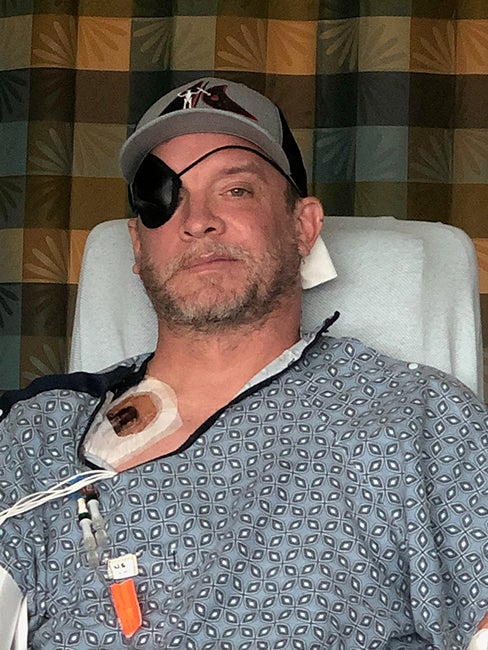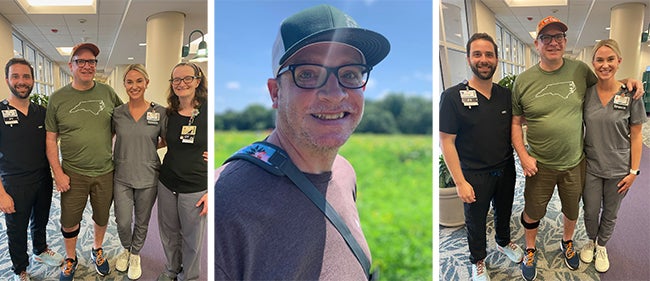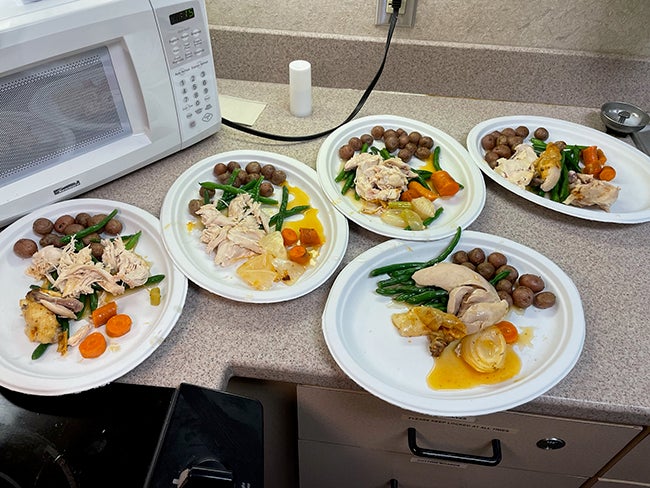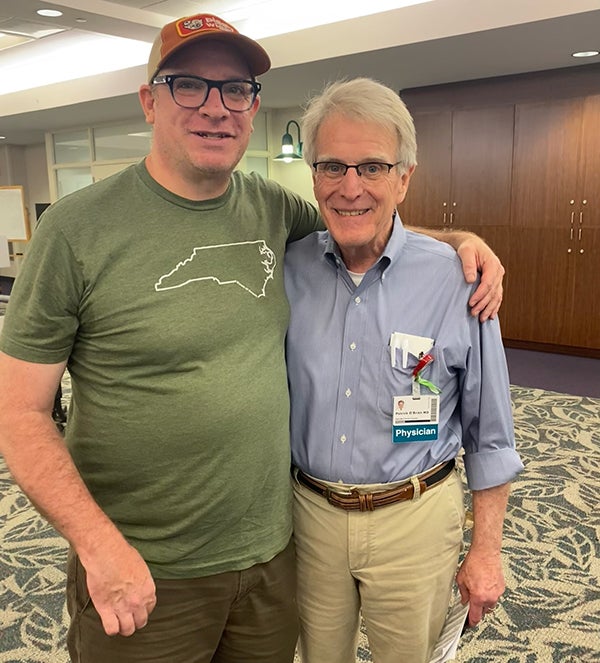The Single-Handed Chef: Aaron's New Path Forward After Brain Abscess
June 24, 2024
By: WakeMed Rehab & Physical Therapy
Categories: Physical Therapy, Raleigh Campus, North Hospital, Stories
Tags: brain abscess, brain injury, brain hemorrhage, disability
Birthdays are a time to celebrate a year past and a year ahead. For children and adults alike, these celebratory days are filled with gifts, laughter and even unexpected surprises. Aaron Vaughen — a personal chef who took pride in making birthdays special for clients and family — was truly surprised by what loomed ahead.
August 2021, Aaron was on a camping trip celebrating his upcoming 47th birthday — approaching on August 7. Suddenly, he had an excruciating headache. It went on unabated for hours despite his efforts to address it with medication and a low stimulation environment.
"I had called my sister for tips on what to do since she gets migraines all the time. I tried taking a pain reliever and sitting in a quiet, dark room, but it just wouldn't go away, so I went to WakeMed North Hospital Emergency Department on August 1. They got me back to see a doctor right away."
Care at WakeMed North Hospital
Aaron was convinced the care team would find a quick remedy, and he'd soon get back to enjoying his birthday. The doctor ordered a computed tomography (CT) scan through Imaging Services. Though Aaron was by then feeling better, the provider was alarmed to find that the scan showed evidence of what appeared to be a stroke. He was admitted to the hospital, and the team determined it would be best to transfer him that evening to WakeMed Raleigh Campus for magnetic resonance imaging (MRI).
The WakeMed Raleigh Campus team identified through diagnostic testing that Aaron had definitely experienced a brain event. He was transferred to another hospital system for further testing where a neurosurgeon was available to determine the exact condition and treat his special case.
"I remember my right leg had stopped working, and I realized this because I went to the bathroom and was like, 'Whoa! That felt different' as I attempted to walk. The next time I went to the bathroom, I fell. The team then determined I was a fall risk, and I was not allowed to walk anymore without assistance."
Craniotomy Surgery
Monday, August 2, Aaron received additional MRIs and another CT scan. The team was still not completely certain what exactly was amiss.
"They told me, 'We can wait for another test, or we can go in.' And, I was aware enough to tell them to just go in."
Aaron was prepped for craniotomy surgery.
"It was like a NASCAR race where a car stops to get serviced. I had these people all around me — like 15 of them coming and going — as they worked to get me transitioned into surgery."
During surgery, they finally found the exact cause of his issues. He had a brain abscess that burst and led to his brain hemorrhage.
"They cleaned it out as best they could. They also put in a Peripherally Inserted Central Catheter (PICC) line, which I was on for three months."
During craniotomy, the surgeon shaved a section of Aaron's hair and removed a small piece of the bone flap (skull bone) to access to the brain. The abscess was thereafter drained and removed.
Aaron woke up from a successful surgery to find that along with lost use of his right leg, he had also lost vision in his right eye and use of his right arm. He also had complete right-side weakness.

C. Difficile Infection
Infectious disease doctor, Becky Smith, MD, was brought onto the team to address C. difficile, which Aaron twice contracted during his hospitalization. The infection caused diarrhea and fever. He eventually required a fecal transplant.
Noting the radical life events Aaron had experienced, Dr. Smith ordered a cake for Aaron's birthday on August 7.
"Dr. Smith was really awesome. She said that a chef should definitely have a cake for his birthday. I wasn't really feeling in the mood for my birthday, but it was a nice thought. I kept telling everyone I was now 48, and my mom kept reminding me that I'd just turned 47."
With the abscess removed, it was time to get to work restoring his right-side functionality. Occupational and physical therapists came into his room, got him up and helped him move a bit. By August 11, he was well enough to enter intensive inpatient rehab.
A Transfer to the WakeMed Rehabilitation Hospital
Aaron was transferred back to WakeMed Raleigh Campus to be an inpatient at the Rehabilitation Hospital. There he met numerous occupational, recreational, speech and physical therapists as well as nurses and staff who were committed to his care.

Aaron was not in a good spot mentally and emotionally by the time he arrived for rehabilitation. He'd lost vision in his right eye and use of his right side — just in time for his birthday. He feared he would never return to his passion as a personal chef since he was right-handed and was now on an uphill climb to regain any sense of normalcy. Yet, the care team at WakeMed wouldn't let him give up. They honored his position as a chef and worked hard to help him find a way back to the work he loved.
"I remember one time because they all knew I was a chef, the nurse lifted up the food cover for dinner and decided to get me something more appealing and appetizing from the cafeteria."
Ryan Molinaro, PT, served as Aaron's physical therapist, helping him begin moving his body again.
Molinaro shares, "He was in pretty rough shape, for lack of a better word. He came here straight from brain surgery and unable to sit up or get out of bed by himself. At the beginning, our focus was helping him gain that ability to sit up by himself. That built the foundation for everything else, and it took time to get to that point. Our team collaborated and found the right individualized medical and therapeutic treatment. Once we got to that point, his progress took off. He went from not being able to sit up, get out of bed or do anything by himself to a week later, getting up and walking the trail in our Health Park. That was a huge milestone for him. I have this vivid memory he was wearing a shirt that said 'straight out of brain surgery,' as a play on words to 'straight out of Compton.' It was a humorous and happy memory to see him wearing it and taking steps forward. Then we got him in the exoskeleton, and we worked a lot more on taking perfect steps. As part of that effort, Caroline King, Joe Jourdain and I helped him into the exoskeleton. By the time he graduated, he was walking with just a brace. This was a huge win because he came to us down in the dumps. He thought there was no hope. Those small victories throughout his time here helped him stay motivated."
Aaron also found an ally in his speech-language pathologist, Michelle Rahl, SLP. She was one of the first people to connect with Aaron to help him begin to speak more clearly as he'd also been left with slurred speech following brain surgery.
Laughing, Aaron recalls, "I didn't like her at first. She made me blow in this thing to address my slurred speech. I was resistant and irritable. But, one day she came in to work with me, and she told me what I needed to hear. She gave me that push I needed to stop feeling sorry for myself and get to work. She said, 'You know, you're going to get better if you put in the work.' From there on out, I stopped fighting her on treatments, and my speech started getting better."
Rahls has fond memories of Aaron's turning point.
She observes, "His cognition was relatively strong when he came to WakeMed Rehab, so addressing his speech, we determined, could give him early wins. So, I saw him pretty quickly after he moved to WakeMed. Since he didn't like getting out of bed, we did a lot of our work while he was lying there. We used a respiratory muscle strength training tool to help address his speech issues. He had slurred speech, low vocal volume and low breath support. But, yes, he didn't love doing speech-related work initially. Yet, his speech is clear today. I'm very proud of Aaron."
A great victory during his time in the WakeMed Rehabilitation Hospital was when the team, including occupational therapist Teresa Kreis, OT, gained permission to take Aaron on a grocery run to buy ingredients to make dinner. Aaron bought what he needed to prepare roast chicken with carrots, green beans and potatoes.
Kreis remembers, "Aaron had a lot going on when he got to rehab. We could have spent a whole day doing therapy with just him those first few weeks. I remember the 'aha' moment we had when we realized how we could help him get a handle on the problems he was having with his vision and what a difference that made. Several moments like that with all the members of the team, Aaron included, helped us come together, making a huge difference in his recovery. Once he started moving forward, Aaron never stopped. I was so excited when we could help him start cooking again, figuring out how to adapt it to his needs. And, what an impressively plated and delicious meal! Way better than anything I could do!"

Reflecting on that eventful outing and cooking experience, Rahl's recalls, "Aaron lit up. It seemed like the first time he felt he could one day return to the profession he loved. Plus, the food was so delicious. Our team devoured it."
Since his discharge from the Rehabilitation Hospital on September 30, Aaron has continued to see Patrick James O'Brien, MD, a physical medicine doctor, for ongoing care. He also continues with outpatient physical therapy.

Aaron's Life Today
Thanks to his incredible rehab team, Aaron has newfound skills and strength for a path forward in life. Today, he is the owner/operator of the Single-Handed Chef. The aim is to teach others who have a disability how to cook using one hand.
Amazingly, Aaron has been able to reinvent himself as an incredible chef using his non-dominant left hand. His loss, just in time for his birthday, shaped him into a man with a life mission to give the gift of hope to those who find themselves in need of new beginnings.

WakeMed Stroke Rehabilitation
At WakeMed, we provide a supportive and healing environment that will help you as you recover from a stroke.
We believe in a team approach to care — from the moment you enter one of our emergency departments to the inpatient rehab program and outpatient therapy, our certified rehab stroke programs are designed to provide a personalized plan of care that includes the patient and family. It is our goal to give you the very best care — providing excellent, evidence based medical care, therapy interventions and emotional care and support. We work with you at each phase of recovery to develop achievable goals.
WakeMed Rehab Hospital
Our flagship Rehab Hospital is a 103-bed inpatient rehab facility (IRF) with dedicated units and gyms for children’s/pediatric rehab, spinal cord injury and brain injury. These units are equipped with highly advanced technology to address the specific needs of adults and children in recovery.
WakeMed Outpatient Centers
WakeMed’s 10+ outpatient rehabilitation centers connect adults and children with outpatient physical therapists, occupational therapists, speech and language pathologists and even nutritionists for ongoing therapies and specialty programs, such as vestibular rehab therapy for balance issues, vertigo and dizziness after stroke and brain injury and aquatic therapy in WakeMed Rehab’s pool.
If you or someone you love is suffering with challenges after a stroke, contact WakeMed Stroke Rehabilitation Admissions Department at 919-350-7876 or e-mail the Admissions Department at wmrehabilitation@wakemed.org.